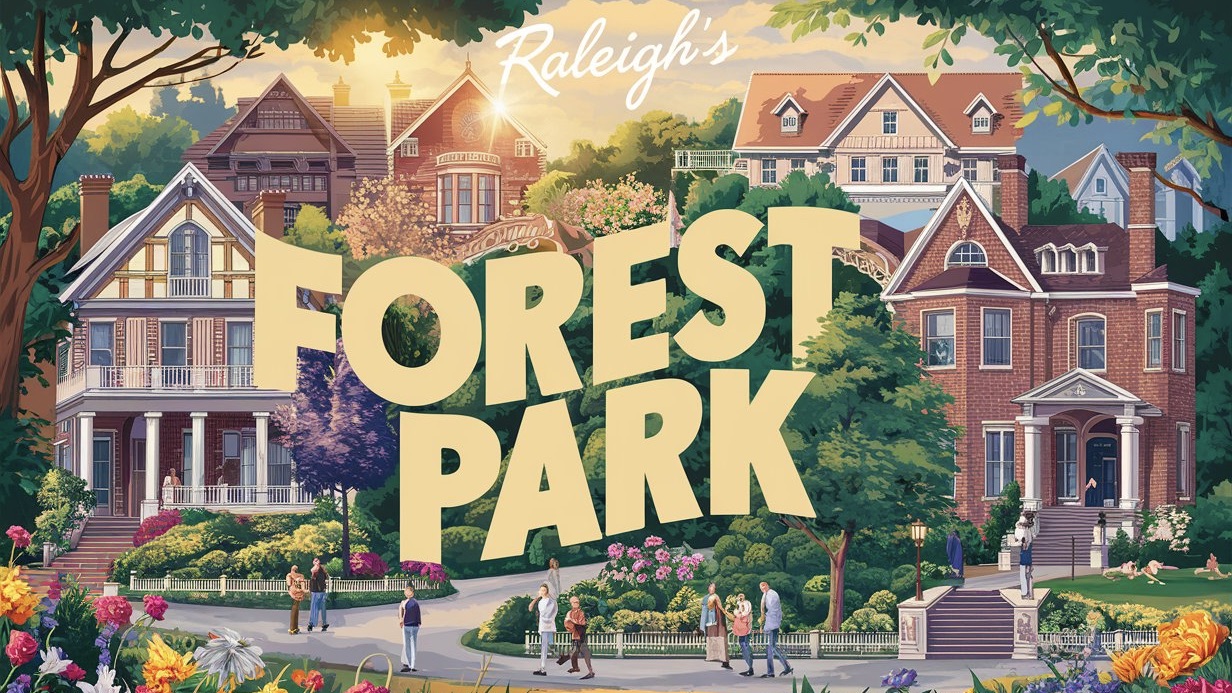Welcome to Forest Park, one of Raleigh’s most prestigious and historically rich neighborhoods. Formerly known as Cameron Park, this area is a seamless blend of colonial history and modern living, offering a unique lifestyle for its residents.

A Brief History of Forest Park

Forest Park, originally named Cameron Park, was developed between 1910 and the 1930s. It was the most upscale of Raleigh’s early-twentieth-century suburbs, specifically catering to the white upper-middle-class. Unlike its contemporaries Glenwood-Brooklyn and Boylan Heights, which attracted a broader cross-section of the middle class, Forest Park exclusively targeted affluent professionals. This included local business owners, professors, lawyers, and government officials.
Unique Architectural Styles
The neighborhood is architecturally diverse, featuring transitional Queen Anne/Colonial Revivals and purer Colonial Revivals. You’ll also find large bungalows and eclectic styles like Georgian Revival, Tudor Revival, and Mission Revival. Despite the stylistic variety, all houses share a common trait: they are large and upscale, reflecting the affluence of their original inhabitants.
Community and Landscape
Three ravines cut through Forest Park, defining its landscape and creating beautiful parkland interspersed with residential blocks. The neighborhood’s street plan is a mix of traditional grids and curvilinear designs around the ravines, giving it a unique and picturesque layout. Mid-block alleys provide access to backyard garages, maintaining the aesthetic appeal of the front yards and public spaces.
Modern Living in a Historic Setting
Forest Park’s appeal is not only in its history and architecture but also in its modern amenities. Located just west of downtown Raleigh, the neighborhood offers easy access to shopping, dining, and entertainment. Hillsborough Street, a major thoroughfare with a streetcar line, runs through the area, adding to its convenience and allure.
Notable Residents and Community Spirit
Forest Park is home to some of North Carolina’s most notable figures, including Governor Roy Cooper, Attorney General Josh Stein, and N.C. State Chancellor Randy Woodson. The community spirit here is strong, with a mix of long-term residents and newcomers who value the neighborhood’s historic charm and modern conveniences.
Educational Institutions
The neighborhood is served by the architecturally distinctive Wiley School and Needham Broughton High School, built in the late 1920s. These schools reflect the neighborhood’s commitment to quality education and community development.
From Past to Present
Forest Park experienced a downturn in the mid-20th century as original homeowners passed away and houses were converted to rental properties. However, by the late 1950s, the demand for owner-occupied housing surged again, driven by the expansion of North Carolina State University. Today, Forest Park has returned to a stable, vibrant community of owner-occupied homes.
Why Choose Forest Park?
Choosing to live in Forest Park means embracing a lifestyle that values history, community, and modern amenities. Whether you’re a family looking for a nurturing environment or a professional seeking a prestigious address, Forest Park offers the perfect blend of past and present.
Fun Things to Do
- Stroll Through Historic Downtown
- Explore art galleries, shops, and restaurants.
- Enjoy a bite at Sugar Magnolia Cafe & Emporium for N.C.-style Southern cooking.
- Grab a hot dog at Shorty’s Famous Hot Dogs, a family-owned business since 1916.
- Shopping
- Visit The Cotton Company and create a gift basket filled with Tar Heel souvenirs.
- Stop by the Wake Forest Farmers Market for local cheeses, fruits, soaps, and other gifts.
- Dive into History
- Explore the Wake Forest Historical Museum.
- Visit the campus of Southeastern Baptist Theological Seminary, the original Wake Forest College campus before it moved to Winston-Salem in the 1950s.
- Sports and Recreation
- Enjoy The Factory with ice rinks, a skate park, indoor soccer, an inflatable playground, miniature golf, and go-carts.
- Visit Heritage Golf Club for top-flight golf year-round.
- Cap the day off at White Street Brewing Company with friends.
- Nature and Outdoors
- Discover Falls Lake State Recreation Area for boating, camping, cycling, hiking, fishing, or bird-watching.
- Catch a gorgeous sunset over the lake after a fun-filled day.
Forest Park, Previously Cameron Park’s 5 Most Important Points
- Median Estimated Home Value: The median estimated home value in Cameron Park is $987,000, which is significantly higher than the median home values in Raleigh, Wake County, North Carolina, and the USA as a whole. This indicates that Cameron Park is a high-end neighborhood with expensive homes.
- Population Change since 2020: Cameron Park has experienced a population growth of 48.7% since 2020, which is much higher than the population growth rates of Raleigh, Wake County, North Carolina, and the USA. This suggests that Cameron Park is an attractive and desirable area for people to live in.
- Median Age: The median age in Cameron Park is 29, which is lower than the median ages in Raleigh, Wake County, North Carolina, and the USA. This indicates that Cameron Park has a relatively young population.
- Income Per Capita: The income per capita in Cameron Park is $96,744, which is significantly higher than the income per capita in Raleigh, Wake County, North Carolina, and the USA. This suggests that Cameron Park is an affluent neighborhood with residents who have high earning potential.
- Walkability Scores: Cameron Park has an overall walkability score of 3.1, with amenity and leisure scores of 3.1 and 3.8 respectively. This indicates that Cameron Park is a moderately walkable neighborhood with access to amenities and leisure activities.
At Brazoban Realty Group, we are here to help you find your dream home in Forest Park or any other neighborhood in Raleigh. Contact us today for personalized assistance. Don’t forget to leave your comments and questions below, and subscribe to our newsletter for weekly real estate and market updates.
Sources:














